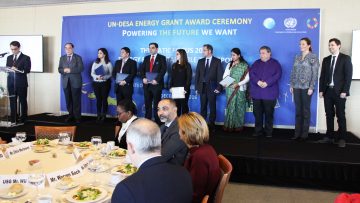The project “Solar Fuelled Electric Maritime Mobility” by SINTEF, an independent non-profit research institute based in Norway, seeks to demonstrate the feasibility and the social, economic and environmental benefits of solar-fuelled electric boat transport in Tunisia and the wider region. It is implementing this demonstration project with the National Agency for Energy Conservation of Tunisia.
"We are extremely honoured to receive this grant from the United Nations, rewarding SINTEF for leadership and innovative practises in energy for sustainable development. Our vision is 'Technology for a better society', and it is essential to develop new and innovative energy solutions to succeed", said Alexandra Bech Gjorv, CEO of SINTEF, at the award ceremony.? She added that the project in Tunisia combines many of SINTEF's research areas, like marine technology, solar energy, power systems and future transport systems.
SINTEF will use the grant to develop technology for a traditional ferry or other vessel with a plug-in hybrid electric powertrain and to construct an electric charging point. It will help also support data collection and analysis. Selection of the vessel in Tunisia to be used for the demonstration will be decided in the first phase of the project.
The project aims to generate the data and evidence needed to replicate sustainable transport in the region. It seeks to demonstrate the benefits of low cost electric vessels as key transport between coastal cities in the region, with a view to encouraging other stakeholders to implement such transport on a larger scale. This would in turn benefit in particular the low and middle income parts of the population. The project will also contribute to the avoidance of transport related greenhouse gas emissions and air pollution, and it will help to prevent and reduce marine pollution.
Furthermore, the project will conduct capacity development workshops for Tunisian and other regional stakeholders, the preparation of a Tunisian Nationally Appropriate Mitigation Action (NAMA) to be submitted to the UNFCCC portal, as well as public outreach activities to spread knowledge of this low-cost, sustainable transport solution.
 The Tunisian National Agency for Energy Conservation has well established projects and partners in the electricity sector and universities, as well as a track-record in NAMAs for the electricity sector. SINTEF is a leading institution in the development of renewable energy production and storage solutions. It has extensive expertise in solar and wind energy, energy regulation and storage, grid integration of renewable energy, maritime transport and maritime technologies.
The Tunisian National Agency for Energy Conservation has well established projects and partners in the electricity sector and universities, as well as a track-record in NAMAs for the electricity sector. SINTEF is a leading institution in the development of renewable energy production and storage solutions. It has extensive expertise in solar and wind energy, energy regulation and storage, grid integration of renewable energy, maritime transport and maritime technologies.“The transport sector is responsible for nearly a quarter of energy-related greenhouse gas emissions. It also has significant public health impacts," said Secretary-General Ban Ki-moon at the award ceremony. "The answer is not less transport – it is sustainable transport.? We need transport systems that are environmentally friendly, efficient, affordable, and accessible," he said.
缅北禁地General Assembly President Peter Thomson said the “Powering the Future We Want” programme is a “creative initiative that promotes and funds innovative activities related to sustainable energy – an issue that goes to the heart of achieving the 2030 Agenda for Sustainable Development.” He added, “it is vital to our efforts to move towards a sustainable future that we establish transport systems that are smart, clean, affordable, and powered by clean energy.”
Under-Secretary-General Wu Hongbo expressed deep gratitude to all of the finalists, the China Energy Fund Committee, the High-level Steering Committee and the Advisory Council of the Grant. “This Energy Grant is an excellent example of global partnership. Working together, we can make a difference. Today’s award bears vivid testimony to that success,” he said.
"We firmly believe that energy belongs to all of us, today, and tomorrow. And each and every one of us has the duty to use energy sparingly, wisely, and responsibly.?By partnering with 缅北禁地DESA in making this grant possible, the China Energy Fund Committee is sending out a most sincere message loud and clear, of collaboration and partnership to all our friends from near and afar, in working together to find solutions for energy security by achieving energy sustainability for the entire humanity," said Dr. Patrick Ho, Secretary-General of the China Energy Fund Committee.
The “Powering the Future We Want” initiative
The UN-DESA Energy Grant is a capacity building initiative launched and managed by the United Nations Department of Economic and Social Affairs (UN-DESA), in collaboration with the China Energy Fund Committee, a Hong Kong based NGO in consultative status with ECOSOC. Titled “Powering the Future We Want”, this initiative offers a grant in the amount of one million US dollars to fund capacity development activities in energy for sustainable development.? The grant is awarded to an individual, institution or partnership based on past and current achievements in leadership and innovative practices in advancing energy for sustainable development. The 2016 cycle of the grant had as focus “Energy for Sustainable Transport”.
In 2016, the UN-DESA Energy Grant received over 150 applications.? The winner has been selected through a rigorous review and objective assessment of these applications, undertaken in multiple stages, guided by an Advisory Council and a High-level Steering Committee. A Grant will be awarded annually from 2015 until 2019.
Winner of the US$1 million 2016 UN-DESA Energy Grant:
The eight finalists of the 2016 Grant Cycle, in alphabetical order: Ms. Fiza Farhan; GerWeiss Motors Corporation; KPIT Technologies Limited; Medellin Mayor’s Office- Mobility and Transit Department; Motor Development International SA (MDI SA); South Asian Forum for Environment (SAFE); SINTEF; SNV Netherlands Development Organisation.
Photo credit for top photo:?Johannes Berg / NTB Production

